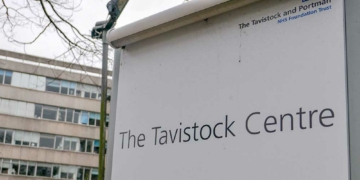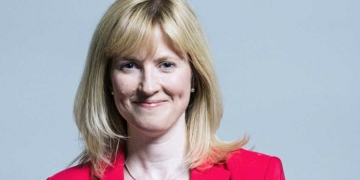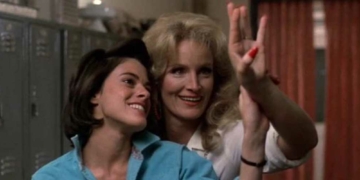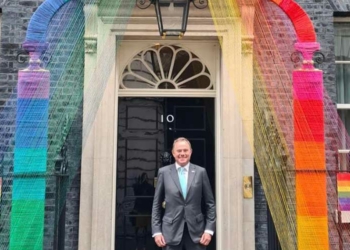There’s an episode in the final season of The West Wing in which Senator Arnie Vinick (played by Alan Alda) finds himself at the centre of a media storm following an accident at a nuclear power station which he had claimed was safe. Vinick judges that the only way he will neutralise the hostile narrative and stand a chance of getting the focus back on his campaign for the Presidency is by giving a ‘till-they-drop’ press conference. He stands in front of a microphone, surrounded by reporters, and promises to answer every single question they have about the nuclear plant. The press conference will only stop when the reporters run out of questions. It’s a high-risk move.
The new-ish CEO of Stonewall, Nancy Kelley, isn’t quite presiding over a nuclear disaster, but the last six months have come pretty close. The Reindorf Report and the Forstater appeal judgment were the first rumblings of tectonic shifting, and led to the beginnings of a steady exodus from Stonewall’s Diversity Champions scheme. The resignation of Kathleen Stock communicated powerfully the human cost of resisting Stonewall’s influence within academia. And then the Stephen Nolan podcasts were released, laying bare Stonewall’s MO and raising the temperature further.
But it was the BBC’s departure from Stonewall’s Diversity Champions scheme and the Workplace Equality Index which blew the roof off the nuclear reactor, as it were. Surveying the wreckage, Kelley has concluded that she’s out of options – it’s time to talk. Had she wanted to, she could have opted for an easier ride than she got with the BBC’s Emma Barnett on Woman’s Hour. But, like Arnie Vinick, Kelley needed to walk though some fire in order to stand any chance of influencing the media agenda.
So, for thirty-five minutes Emma Barnett quizzed, probed and challenged Nancy Kelley on her personal beliefs and Stonewall’s policies and activities.
These are some of the things that struck me as I listened.
Nancy Kelley is a true believer, but she has limits
Asked whether her declaration of belief that trans women are women is meant metaphorically or literally, Kelley replied ‘literally’. But, when asked whether she believes a human being can change sex, she had this to say:
‘Yes, you can change some sex characteristics…[but] if that is everything that goes into making a sexed body, no.’
To the best of my knowledge, former Stonewall CEO Ruth Hunt never answered these sorts of questions – so it was refreshing to hear Kelley do so with ease and frankness. We never really found out much about what Hunt believed – some have always felt that her ‘trans women are women, trans men are men’ declarations were dutiful statements of a shibboleth rather than authentic personal belief. But Nancy Kelley has put her cards on the table and that is welcome.
Stonewall is making a tactical retreat on the ‘mother’ issue
Kelley knows that some of Stonewall’s lobbying activities cannot survive public scrutiny – and its attempts to erase the word mother are top of that list. Barnett cited the Stephen Nolan podcast’s claim that Stonewall advised the Scottish government to remove the word mother from its maternity policy. Kelley responded: ‘we’re not interested in removing or erasing the word mother’, which is – to put it charitably – economical with the truth. She then claimed that Nolan had used the document ‘out of context’ – but Nolan’s investigative journalist David Thompson responded with evidence which suggests this is not true. What is clear is that this is an awkward issue for Stonewall and Kelley would like it to go away quickly – hence Stonewall’s statement late last week that it will now change its policy on the word ‘mother’.
Kelley is unwilling to clarify what constitutes transphobia.
Asked whether J K Rowling is transphobic, Kelley tied herself in knots trying to avoid a straight answer. (In stark contrast, Ruth Hunt was quick to describe the lesbian protestors at 2018 London Pride as transphobic.)
Why this reticence? After all, Stonewall’s definition of transphobia is on its website for all to read: “The fear or dislike of someone based on the fact they are trans, including denying their gender identity or refusing to accept it.”
Part of the reason, perhaps, is that the outcome of the Maya Forstater employment appeal tribunal has undermined Stonewall’s moral authority. Having attempted to manufacture a taboo around non-acceptance of gender identity theory by designating refuseniks transphobic, it’s now difficult for Kelley to toe this line in public given that ‘gender critical’ beliefs have been defended by Index on Censorship and the Equality and Human Rights Commission, and are protected by the Equality Act. Instead, Kelley argued that, while these views are not intrinsically transphobic, they can be harmful if expressed in certain ways.
Claiming that some of JK Rowling’s words were ‘harmful in terms of their impact on the trans community’, Barnett asked her to explain, and Kelley’s response was a now all-too-familiar misrepresentation of Rowling’s actual words:
‘When we talk about ideas that are based on the concept that trans women are automatically a risk to cis women…then I think that does cause harm. When such a prominent person expresses that view.’
It’s hard to escape the conclusion that there is, in truth, no form of words Rowling could have used to describe her experience, or express her concerns, which would meet with Kelley’s approval.
Kelley appears to think that same-sex attraction can be intrinsically discriminatory against trans people
Emma Barnett read the statement Kelley had made to BBC journalist Caroline Lowbridge in which she compared not wanting to date trans people to not wanting to date ‘people of colour, fat people [or] disabled people’ and advised lesbians who exclude male-bodied people that ‘it is worth considering how societal prejudices may have shaped your attractions.’ (Remember, this was a considered statement given by Kelley in writing – she was not pressed into speaking spontaneously on the record.)
Quizzed on this, Kelley offered a mixture of doubling-down and flannel:
‘I’m a feminist. It is completely core to my beliefs that nobody should ever be pressured into dating, into sex, we should only choose to be with who we want to be with…It’s really important to be really unequivocal about that. The difference between saying ‘we might want to think about something’ and saying ‘you are prejudiced’…it’s completely possible to have dating preferences that aren’t to do with prejudice – it’s also completely possible to have dating preferences that are.’
Barnett pushed further:
But you are not just a random person on the internet – you are the CEO of Stonewall – so even floating the idea of prejudice…do you not see why this is a powerful statement out there?
And this was Kelley’s response:
‘I am really happy with what I said. It wasn’t intended to label anyone’s dating choices as right or wrong…for me, I’m a trans-inclusive feminist so I do believe trans women are women so I wouldn’t make that exclusion…other people don’t agree with me, people I know and love don’t agree with me…and that’s OK.’
Re-read those first eight words; ‘I am really happy with what I said’.
Nancy Kelley, the CEO of Stonewall – an organisation founded by lesbians and gay men – compares same-sex desire to racism and advises us that when, as homosexuals, we choose to reject opposite-sexed bodies we should reflect on whether our desires have been shaped by ‘societal prejudice’.
And she is happy with what she said.
To the best of my knowledge, Hunt’s Stonewall never explicitly stated that gay men could be female-bodied, or lesbians could be male-bodied – and Ruth Hunt avoided situations in which she might be asked this question.
With this interview, Nancy Kelley has dispelled any vestiges of ambiguity. She is, in fact, doing exactly what she claims to oppose – pressuring lesbians to accept males as sexual partners, and gay men to accept females. Kelley frames it as progressive, but her attempt to shame lesbians and gay men into changing their same-sex orientation is cruel and degrading. (We have a term for this kind of thing, Nancy – and Stonewall is supposed to be against it.)
It doesn’t seem likely that this interview will have repaired much of the reputational damage Stonewall has suffered. Barnett zeroed in on a series of salient issues and Kelley rarely had any straight answers to offer – sometimes the more she spoke the less sense any of it made.
Her toughest problem is this: Stonewall seems committed to its new mission as a gender identity lobbyist, but equality law also protects those who reject these ideas. It doesn’t help that Stonewall’s commercial strategy has also been undermined. The Diversity Champions scheme earns Stonewall somewhere in the region of two million pounds each year but, as Peter Daly (one of Maya Forstater’s legal team) has explained, any workplace inclusion programme orientated solely around gender identity theory now has the potential to expose employers to significant legal risk. For how much longer will Stonewall’s clients continue to pay up?
It’s hard to see how Stonewall’s workplace inclusion cash cow can survive long-term unless it evolves. But the sort of changes which would be required to bring it fully into line with the complexity of current equality law would surely be fought by the community of activists with whom Stonewall has curried favour since 2014.
In the world of the West Wing, Arnie Vinick’s ‘till-they-drop’ press conference was only ever going to be an inspirational triumph. But Nancy Kelley’s interview wasn’t scripted by Aaron Sorkin and it didn’t really get anywhere much. My overwhelming feeling at the end of it was one of certainty that the Stonewall I once respected – trustworthy, compassionate, authoritative – has gone for good.
What still remains unclear, though, is what comes next.
Jonny Best is a writer, arts producer, musician, and researcher. He is also the former Artistic Director of Queer Up North International Festival.
Photo from BBC Radio 4’s Woman’s Hour video of the interview.
























Comments
No comments yet, be the first to leave a comment.